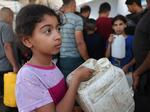
A Palestinian girl holds a container as she waits to collect portable water, in Khan Yunis, in the southern Gaza Strip on Oct. 26, 2023, amid the ongoing battles between Israel and the Palestinian group Hamas.
MOHAMMED ABED / AFP via Getty Images
TEL AVIV, Israel — The streets of Gaza are empty of cars. Many of its bakeries are shuttered; meat suppliers have no refrigeration. Doctors perform operations by flashlight.
Sixty-two aid trucks have entered Gaza since last weekend, carrying much-needed food, water and medical supplies. But none have delivered fuel, which Israel has blocked over concerns it could be stolen and used by Hamas, the militant group that governs the Gaza Strip.
As a result, aid groups have escalated their warnings, saying the lack of fuel has reached a critical point. UNRWA, the United Nations agency that provides relief to Palestinians, says it could run out of fuel within a day.
"The situation is terrible and it gets worse by the hour — not even by the day — every hour, things get worse and worse for people in Gaza," Juliette Touma, an UNRWA spokesperson, told NPR.
Israel launches biggest raid yet into Gaza
The latest warnings over the dire conditions in Gaza come as Israel has increased the intensity of its attacks on the territory over the last few days, with hundreds of airstrikes each night.
Overnight into Thursday, the IDF carried out a "targeted raid" in northern Gaza, the most extensive use of Israeli tanks in Gaza since the war began earlier this month. In a statement, the military said the incursion was carried out "in preparation for the next stages of war."
An IDF spokesperson said the raid involved a number of tanks and troops and "eliminated terrorists and destroyed terrorist infrastructure." The tanks have since exited Gaza, and there were no Israeli casualties, the IDF said.
Aid groups poised to assist with food, fuel shortages
Fuel is needed for U.N. vehicles to collect aid from the border and distribute it across Gaza, said the U.N.'s Touma. Fuel is also used to power hospitals, where doctors have warned that people will die if life-saving medical equipment is forced to go out of operation.
The lack of fuel has also disabled water pumps and restricted an already limited food supply in Gaza, the U.N. warns.
The World Health Organization has said it has trucks on standby across the border in Egypt with medical supplies: "WHO calls for immediate and uninterrupted access into and across Gaza, so that its ailing health system can be urgently revived."
Gaza's bakeries have shut down, including many of those that contract with the World Food Programme. (At least 10 bakeries have been struck and destroyed over the last week, according to the U.N.)
For those that remain intact and operational, long lines form daily, exposing people to airstrikes. The lack of electricity or fuel for generators has started to affect meat suppliers, too, who cannot refrigerate their products, according to the U.N.
In response to an UNRWA appeal for fuel on the social media site X, the Israel Defense Forces responded with a satellite image of what it described as fuel tanks located in Gaza.
"Ask Hamas if you can have some," the agency wrote.
These fuel tanks are inside Gaza.
— Israel Defense Forces (@IDF) October 24, 2023
They contain more than 500,000 liters of fuel.
Ask Hamas if you can have some. https://t.co/Dlag6VdbMq pic.twitter.com/WXzZMFr8yI
The Hamas supply contains "enough for many days for hospitals and water pumps to run," Lt. Col. Jonathan Conricus, an IDF spokesperson, said Thursday.
Death toll in Gaza rises
The reported death has now surpassed 7,000, health officials in Gaza say.
Asked Wednesday about the reported death toll, President Biden responded that he had "no notion that the Palestinians are telling the truth about how many people are killed."
"The Israelis should be incredibly careful to be sure that they're focusing on going after the folks that are propagating this war against Israel," he said, adding that "it's against their interest when that doesn't happen."

People watch as smoke and dust ascend following Israeli bombardment, in Khan Yunis in the southern Gaza Strip, on Thursday.
Mahmud Hams / AFP via Getty Images
The Palestinian agency that produces the death tolls, the Ministry of Health, is nominally operated by the Palestinian Authority, which provides funding and supplies and maintains close contact with hospitals in Gaza. Hamas governs Gaza and likely has close oversight over information Gaza health officials put out. The daily casualty counts are broadly considered to be accurate by humanitarian groups and have been cited by the State Department.
More than 200 hostages remain in Hamas captivity
Gaza's borders are effectively closed, limiting the ability of aid groups and journalists to access the territory in order to independently verify the numbers.
Humanitarian groups warn that the death toll could dramatically increase if Israel follows through with its threats of a ground invasion.
As the conflict nears the end of its third week, more than 200 hostages still remain in Hamas captivity. U.S. officials and hostages' families have urged Israeli forces to delay the invasion in order to leave more time for negotiations over their release.
And hundreds of U.S. citizens are still stranded in Gaza. Massachusetts resident Abood Okal, along with his wife and their 1-year-old son, have been sharing a house in southern Rafah with dozens of others, he told NPR.
They sleep on the floor, without running water and only a couple hours a day of electricity from the home's solar panels. On Wednesday, they ran out of milk for his son, he said.
"We feel fortunate every morning that we wake up and we have lived for another day," Okal said. "But it's becoming increasingly harder and harder to find hope with everything else going around us."
NPR's Peter Kenyon contributed to this report.
Copyright 2023 NPR. To see more, visit https://www.npr.org.